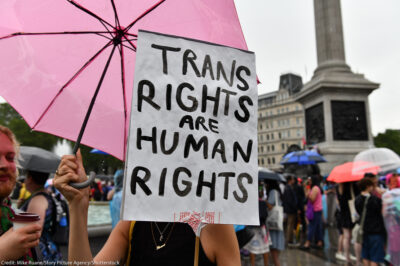Without Any Vote in Sight, House Holds Fourth Hearing on Marriage Rights; ACLU Repeats Call to Exclude Discrimination From Constitution
FOR IMMEDIATE RELEASE
Contact: Media@dcaclu.org
WASHINGTON – Despite signals from House leadership that a vote on a constitutional amendment to deny marriage rights to gays and lesbians will not happen anytime soon, the House Judiciary Committee today held its fourth hearing on denying marriage rights to gay and lesbian families. The American Civil Liberties Union renewed its opposition to the measure and called upon members to reject the politically motivated proposal that would write discrimination into the Constitution.
“Majority Leader DeLay has said that the House will not hold a vote until passage is certain – an extremely unlikely event,” said Christopher E. Anders, an ACLU Legislative Counsel. “At a time when the country is faced with deepening problems in Iraq and a bad economy, Congress should stop wasting its time on repeated hearings on an amendment that cannot pass.”
The debate over denying marriage rights to gay and lesbian couples has escalated following the 2003 Massachusetts Supreme Court decision that those couples cannot be denied the same rights enjoyed by straight married couples, and the city of San Francisco and other local government’s issuance of marriage licenses to over 7,000 gay and lesbian couples. Massachusetts began issuing marriage licenses for gay and lesbian couples on May 17, 2004.
In response to the these actions, Rep. Marilyn Musgrave (R-CO) and Sen. Wayne Allard (R-CO) introduced the Federal Marriage Amendment, which, if adopted, would deny marriage rights to all same-sex and unmarried couples, and prevent state and federal courts from conferring any of the legal benefits of marriage. The amendment would also deny states the right to decide who can get married in their states and preempt the state constitutions of the 50 states.
At a hearing held by the Senate Judiciary Committee this Tuesday, the Republican Governor of Massachusetts, Mitt Romney, a supporter of the amendment, indicated that a constitutional amendment was not necessary. When asked, he replied that he felt that the 1996 Defense of Marriage Act, which allows individual states to not recognize same-sex marriages performed by other states, would stand up to constitutional scrutiny.
Former Rep. Bob Barr (R-GA), the author of DOMA, said at the same hearing that the amendment would be an unnecessary trampling of federalism. “If we begin to treat the Constitution as our personal sandbox, in which to build and destroy castles as we please, we risk diluting the grandeur of having a Constitution in the first place,” Barr said. He called upon Senators to resist “the temptation to use the federal government to meddle in state matters.”
Senate Majority Leader Bill Frist (R-TN) has indicated that the Senate will vote on the measure during the week of July 12, taking the unusual step of a floor vote before the Judiciary Committee has had a chance to vote on it.
“Election year politics should not dictate the procedures of the Senate,” Anders added. “Sadly, gay and lesbian families are the scapegoats this election cycle. Congress should reject codifying discrimination into the Constitution.”
More on the ACLU’s response to the Federal Marriage Amendment can be found at:
/marriageamendment
Stay Informed
Every month, you'll receive regular roundups of the most important civil rights and civil liberties developments. Remember: a well-informed citizenry is the best defense against tyranny.




